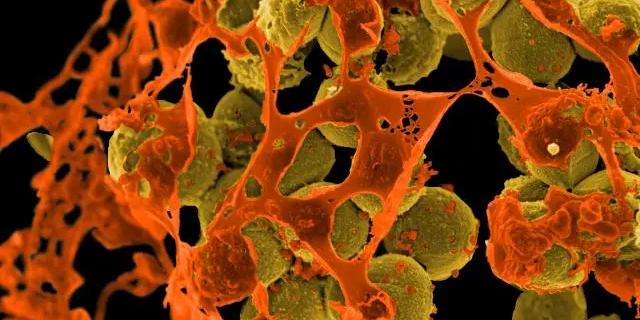MRSA, what is it and how to survive it
Eric,

Well Folks, It’s April and I have been dealing with a massive infection that started out as an Abscess deep inside the groin that burst. I am currently sitting here in my bed hooked up to an infusion (intravenous feed) of the strongest antibiotic that can be safely taken and I am about halfway through the month already. At least I am no longer climbing into the coffin and trying to pull the lid closed.
Anyway, How to survive MRSA? Well there is both reactive and proactive methods. Treatments after the fact tend to be reactive. However, if you don’t want it in the first place, It doesn’t hurt to keep your residence clean, exercise some common sense when using the bathroom or food preparation. THis doesn’t mean you have to wear latex gloves all the time, but it does mean taking some effort to make sure you minimize risk. Believe me, risk management is something I have had to become an expert in. As an aside, some of the links below this article reference sources from “Government FUnded” agencies, which mostly shouldn’t be trusted at face value, but because of archiving practices, a lot of actual scientific based knowledge can often be found in their archives (even if the news media and even some government officials try to steer many away from such data). There is still a lot of valuable information and all you need is a good filter and some reasonable critical thinking skills to suss out the real facts.
Now, what is MRSA, you ask? Well, it’s a breed of antibiotic resistant bacteria that is exceedingly difficult to fight. In specific, it’s a resistant form of Methicillin-resistant Staphylococcus aureus and it has some range of treatments depending on severity [1][2]. In my case, it was extremely severe (basically I was already septic and less than 24 hours from dying). Yes, folks, it can get that bad very rapidly. SInce I am currently in treatment, that means I have survived the first 24 hours in the emergency room and the following 11 days in hospital. In case you are wondering, I am using myself as an example simply because I am in treatment. As of now, I am 13 days into a month long stay at a skilled nursing facility and am doing fairly well.
Now, exactly how did MRSA come about? Well, it’s history can easily be summed up in 2 statements:
- overuse of antibiotics [2][3]
- improper or lack of observing of protocols [4] in hospitals in some locations. Believe me, this is far more common than you might think.
So, how to prevent infection to begin with? Well, even the CDC has a good article on how to handle this (see article [5] below for details)
Some proactive measures I have taken since initial infection:
- Keeping clean (A good hot shower every other day with good quality soap) does a lot. Also, keeping hands clean (washing up after food prep, using toilet facilities, exercising, etc). Also, a bit of research on natural alternatives that can supplement ongoing treatment as well as after treatment ends [6][7][8]. Believe me, there are a lot of “alternative treatments” that work in conjunction with “standard treatments”. However, Prevention is often the best method for handling MRSA before it even starts.
So, take it from a survivor, judicious preventative measures are a lot better than ending up in the hospital after an infection has already set in. By the way, a good search engine for your research would be startpage.com as they tend to properly rank search results as well as keeping your search history a bit more private (why trust google and their known political machinations). Happy searching and keep healthy folks. It may be a dangerous world out there, but that doesn’t mean you have to end up endangered. Remember folks, Knowledge and information are power.
- MRSA, Symtoms and treatment courtesy of the cleavland clinic: https://my.clevelandclinic.org/health/diseases/11633-methicillin-resistant-staphylococcus-aureus-mrsa
- MRSA, Beyond the basics: https://www.uptodate.com/contents/methicillin-resistant-staphylococcus-aureus-mrsa-beyond-the-basics
- THe evolution of MRSA: https://www.ncbi.nlm.nih.gov/pmc/articles/PMC124322/
- courtesy of cedars sinai Medical centers (these are the top experts folks!): https://www.cedars-sinai.org/quality-measures/preventing-hospital-infections/mrsa.html
- General Information | MRSA | CDC: https://www.cdc.gov/mrsa/community/index.html
- Apple Cider as a treatment: https://www.nature.com/articles/s41598-020-78407-x
- Antibiotics and bioactive natural products in treatment of MRSA: https://www.ncbi.nlm.nih.gov/pmc/articles/PMC4441159/
- How light turns ordinary ydrogen Peroxide into MRSA treatment: https://www.bu.edu/articles/2019/blue-light-therapy-mrsa-treatment/




